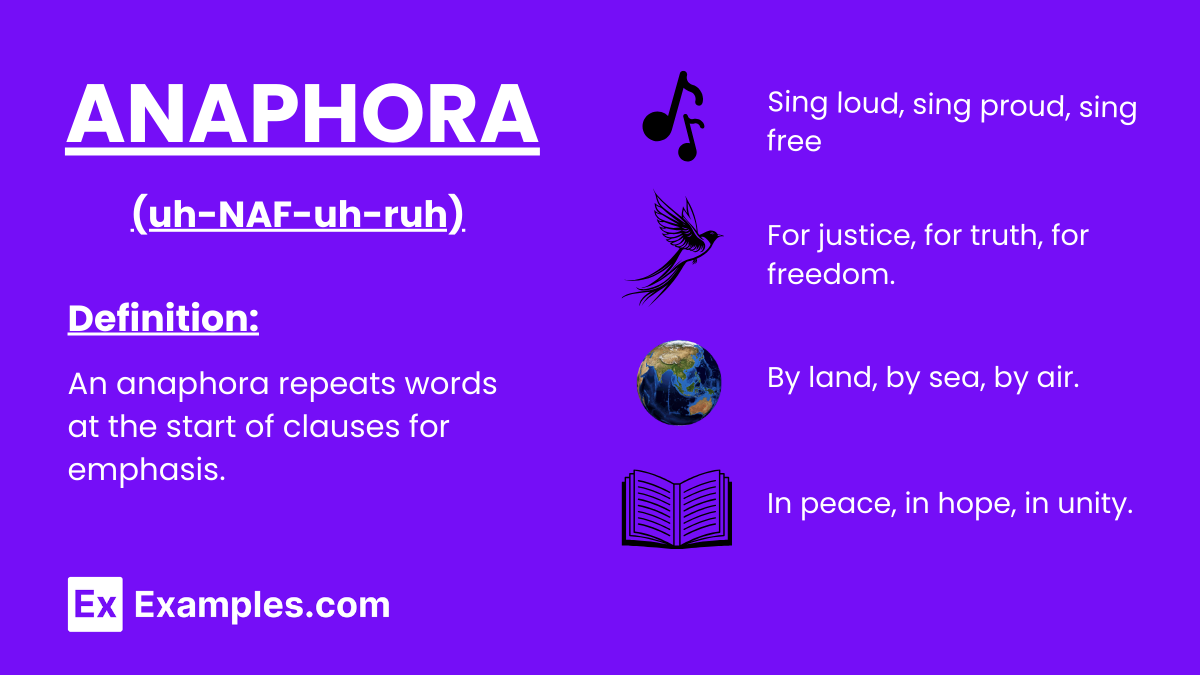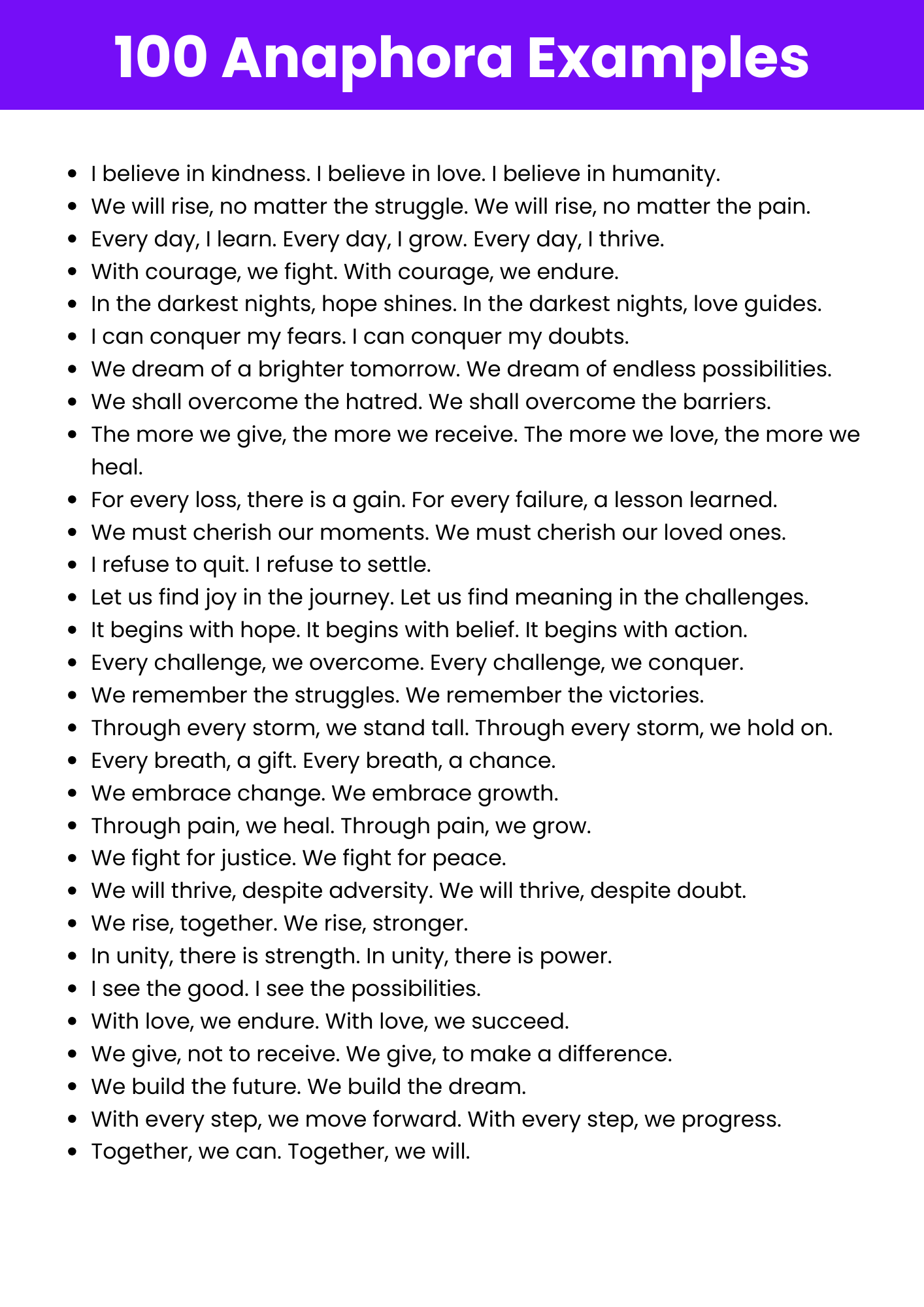Anaphora
What is Anaphora? – Definition
Anaphora is a rhetorical device involving the deliberate repetition of a word or phrase at the beginning of successive clauses or sentences, used to emphasize a point and create a rhythmic effect.

Generated Anaphora Examples

Download Anaphora Examples
Enhance your understanding with our comprehensive PDF guide.
Download PDFExamples of Anaphoras
- Every day, every night, every moment, I think of you.
- I will fight for freedom, I will fight for justice, I will fight for equality.
- We shall overcome, we shall persevere, we shall succeed.
- Let freedom ring, let justice shine, let hope prevail.
- She believed in her dreams, she believed in her strength, she believed in herself.
- I have a dream, I have a vision, I have a purpose.
- In the morning, in the evening, in the silent hours of the night, I remember you.
- Not for glory, not for honor, not for riches, but for love.
- It takes courage, it takes determination, it takes resilience to succeed.
- We will rise above, we will stand strong, we will conquer the odds.
- I will not give up, I will not surrender, I will not lose hope.
- For the trees, for the animals, for the planet, we must act now.
- Under the sun, under the sky, under the stars, I will find you.
- As time passes, as moments fade, as memories linger, we move forward.
- In the spring, in the summer, in the autumn, we shall meet again.
- Through the storm, through the rain, through the darkness, I will find the way.
- I will run, I will leap, I will soar above the challenges.
- For my family, for my friends, for my home, I will work tirelessly.
- For peace, for love, for unity, we must come together.
- I see hope, I see change, I see progress in every step.
- Every hour, every second, every heartbeat, I am here for you.
- The circle of life, the circle of love, the circle of hope will go on.
- We laugh together, we cry together, we grow together.
- Sing with joy, sing with hope, sing with all your heart.
- Run to your dreams, run to your goals, run to your destiny.
- Now is the time, now is the moment, now is our chance.
- For my nation, for my people, for our future, I will persevere.
- Fly to new heights, fly to new dreams, fly to a better tomorrow.
- Through the storm, through the night, through the fire, I will keep going.
- Rise with strength, rise with courage, rise with hope.
Types of Anaphoras
Emotional Anaphoras
These focus on emotions, emphasizing feelings like love, hope, or fear.
- Love is eternal. Love is boundless. Love is universal.
- Hope brings light. Hope brings joy. Hope brings strength.
- Fear consumes. Fear blinds. Fear overwhelms.
- Happiness spreads. Happiness uplifts. Happiness inspires.
- Anger destroys. Anger clouds. Anger divides.
Inspirational Anaphoras
Used to motivate and uplift, these anaphoras focus on hope, perseverance, and success.
- Rise to the challenge. Rise to the occasion. Rise to your potential.
- Success takes effort. Success takes courage. Success takes persistence.
- Dream big. Dream often. Dream without limits.
- Keep moving forward. Keep aiming high. Keep believing in yourself.
- Act with kindness. Act with love. Act with purpose.
Literary Anaphoras
Common in poetry and speeches, these emphasize rhythm and meaning.
- I will fight for freedom. I will fight for equality. I will fight for justice.
- We shall overcome. We shall succeed. We shall persevere.
- Let the bells ring. Let the songs echo. Let the voices rise.
- In the morning, in the evening, in the silent hours of the night, I dream of peace.
- Remember the sacrifices. Remember the struggles. Remember the victories.
Rhetorical Anaphoras
Used in persuasive writing and speeches to emphasize a key idea.
- Why do we wait? Why do we hesitate? Why do we falter?
- Who will stand? Who will fight? Who will lead?
- What is our purpose? What is our mission? What is our goal?
- No more silence. No more fear. No more oppression.
- Is it enough? Is it fair? Is it just?
Universal Anaphoras
These reflect universal anaphoras that are timeless and relatable across cultures and generations.
- Love conquers all. Love unites all. Love endures all.
- Freedom is precious. Freedom is powerful. Freedom is essential.
- Time heals. Time teaches. Time reveals.
- We are stronger together. We are better together. We are united together.
- The human spirit endures. The human spirit perseveres. The human spirit triumphs.
Historical Anaphoras
Anaphoras rooted in historical events, struggles, and triumphs, emphasizing lessons from the past.
- We remember the battles. We remember the victories. We remember the sacrifices.
- For the land. For the people. For the future.
- Justice for the oppressed. Justice for the forgotten. Justice for the silenced.
- Learn from the past. Learn for the future. Learn to grow.
- Heroes fought. Heroes led. Heroes inspired.
How to Identify an Anaphora?
To identify an anaphora, look for deliberate repetitions of words or phrases at the beginning of successive clauses, sentences, or lines. Anaphoras are often used to create rhythm, emphasize a point, or invoke strong emotions.
- Look for repeated words or phrases at the start of sentences or clauses.
- Pay attention to the rhythm and cadence it creates in the text.
- Notice how the repetition emphasizes a key idea or emotion.
- Check how the repetition connects ideas or unifies a message.
- Contrast sentences with and without repetition to observe the effect of the anaphora.
How to Develop an Anaphora?
Developing an anaphora requires purposeful repetition of words or phrases at the beginning of sentences or clauses. Use it to emphasize a anaphora, create emotional impact, or add rhythmic flow to your writing.
- Choose a key word or phrase that reflects your central message or anaphora.
- Repeat the chosen word or phrase at the beginning of successive sentences or clauses.
- Ensure the repetition adds emotional depth or clarity to your point.
- Use simple, impactful language to make the repetition stand out.
- Integrate the anaphora naturally into your text to maintain flow and readability.
Other Metaphor Examples
Anaphoras in Daily Life
Anaphoras that emphasize daily emotions, motivations, and universal truths.
- Every morning is a new hope. Every morning is a new start. Every morning is a gift.
- Love brings happiness. Love brings unity. Love brings peace.
- Time flies. Time heals. Time reveals.
- Success is earned. Success is deserved. Success is celebrated.
- Hope drives dreams. Hope fuels ambition. Hope inspires change.
Inspirational Anaphoras
Anaphoras that inspire individuals to aim for personal growth and positivity.
- Believe in yourself. Believe in your vision. Believe in your strength.
- Keep going. Keep growing. Keep glowing.
- Dream without fear. Dream without limits. Dream with purpose.
- Rise above failure. Rise above fear. Rise above doubt.
- Success takes courage. Success takes persistence. Success takes belief.
Anaphoras in Literature
Anaphoras that highlight key ideas or evoke emotions in literature.
- To be or not to be, that is the question. To live or not to live, that is the choice.
- We came, we saw, we conquered.
- It was the age of wisdom. It was the age of foolishness. It was the best of times. It was the worst of times.
- Freedom is what we fight for. Freedom is what we believe in. Freedom is our right.
- We shall overcome. We shall rebuild. We shall thrive.
Anaphoras in Culture
Anaphoras reflecting the diversity and traditions of different cultures.
- Unity in diversity. Unity in purpose. Unity in progress.
- Traditions define us. Traditions guide us. Traditions unite us.
- Art reflects culture. Art preserves heritage. Art inspires generations.
- Celebrations bring joy. Celebrations create unity. Celebrations honor history.
- Festivals spread love. Festivals bring communities together. Festivals revive traditions.
Anaphoras in Politics
Anaphoras used in speeches to emphasize political ideals and inspire action.
- Change is inevitable. Change is necessary. Change is progress.
- Justice is blind. Justice is impartial. Justice is unwavering.
- Freedom is not free. Freedom demands sacrifice. Freedom requires vigilance.
- Equality is essential. Equality is fair. Equality is just.
- Leadership inspires. Leadership unites. Leadership delivers.
Philosophical Anaphoras
Anaphoras exploring deep questions about life, existence, and purpose.
- Life gives questions. Life gives challenges. Life gives answers.
- Purpose drives action. Purpose drives creation. Purpose drives fulfillment.
- Truth sets us free. Truth grounds us. Truth guides us.
- We search for meaning. We search for wisdom. We search for love.
- Choice defines paths. Choice defines character. Choice defines destiny.
Explore Other Literary Devices
Elevate Your AP English Preparation
Unlock your potential with our comprehensive AP English exam preparation tools designed to help you excel.
- Extensive Question Bank: Access 900+ exam-like questions for both AP English Language and Literature.
- Expertly Crafted: Questions mirror the structure and difficulty of actual AP exams, ensuring relevant practice.
- Detailed Explanations: Understand your mistakes with clear, concise breakdowns of correct and incorrect answers.
- Personalized Learning: Tailor your study sessions with topic-specific tests and adaptive learning tools.
- Comprehensive Coverage: Master all aspects of the AP English curriculum with extensive guides and resources.
Frequently Asked Questions
-
What is an anaphora?
An anaphora is a rhetorical device where a word or phrase is repeated at the beginning of successive clauses, sentences, or lines to create emphasis and rhythm in writing or speech. -
Why is anaphora used in writing?
Anaphora is used to emphasize a particular idea, evoke emotions, and create a memorable rhythm in writing. It enhances the persuasive or poetic effect of the text. -
Can anaphora be used in everyday speech?
Yes, anaphora can be used in everyday speech to highlight key points, inspire an audience, or add emphasis during conversations, speeches, or presentations. -
What are some examples of anaphora?
Examples of anaphora include phrases like “I have a dream” in Martin Luther King Jr.’s speech and “It was the best of times, it was the worst of times” in Charles Dickens’ *A Tale of Two Cities*. -
How can I use anaphora in my writing?
To use anaphora, choose a key phrase or idea you want to emphasize and repeat it at the beginning of multiple sentences or clauses. Ensure the repetition serves a clear purpose in your narrative or argument. -
Is anaphora only used in poetry?
No, anaphora is not limited to poetry. It is used in speeches, essays, prose, songs, and everyday communication to create emphasis and engage the audience.

